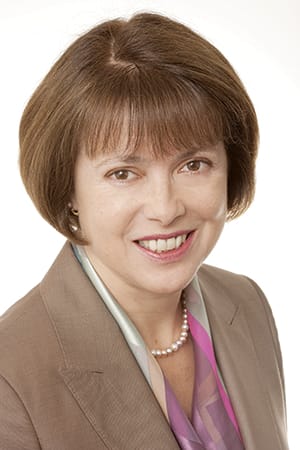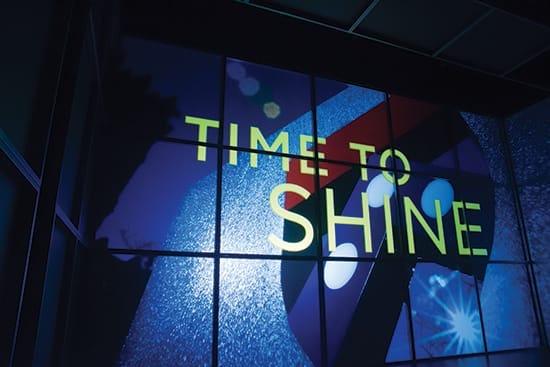George Weiss, W’65, is a very competitive guy, so when he was offered the opportunity to chair Making History: The Campaign for Penn for half of its seven-year span, he declined. He wanted to chair it for the whole duration. People warned him that it would be time-consuming and energy-sapping to chair a campaign. Yet what he came to realize as he led the $4.3 billion effort during its entire seven-year stretch was that the challenge was not so formidable given the people and passion involved.
“It was not nearly as difficult as people had warned me about, because what happened is alumni have such a love affair with Penn. When you talk to any of the other graduates, they always use the same word: love,” he says.
Weiss illustrates his point with a story about a time he was giving a speech to a group of young alumni. He talked about how his daughters had given a scholarship in honor of one of their grandparents. And David Steinhardt, C’91, came up to Weiss afterward, crying. He explained how he had lost his grandfather, a Wharton man—Arthur Abrams, EF’33—and how Weiss knew his father, Michael Steinhardt, W’60. The younger Steinhardt wanted to do something to memorialize his grandfather while his grandmother was still alive. That chance meeting eventually led to the Ruth & Arthur Abrams Endowed Scholarship.
“That was one of the more beautiful moments,” Weiss says.
In a campaign as long and historic as Making History and the accompanying The Campaign for Wharton, it was one evocative moment among many. We share a few more memories herein.
[Editor’s note: Weiss recalls that Wharton alumni in particular were very gracious during the Campaign, probably because they first arrived at the School in much the same way as he did. Read more about it in our side story, “Passion and Grace From the Get-Go.”]

The Penn community gathered for the Time to Shine celebration on April 19, 2013, culminating the monumental success of Making History. For alumni leaders and volunteers such as George Weiss, W’65, and Robert Levy, WG’74, the event provided more fond memories in addition to the many others created throughout the seven-year campaign.
All Mapped Out
Then-Wharton Dean Patrick Harker, CE’81, GCE’81, GR’83, HOM’87, first asked Robert Levy, WG’74, to chair The Campaign for Wharton. Soon thereafter, long-time Penn Trustee James S. Riepe, W’65, WG’67, HON’10, asked him to co-chair Making History.
“I said, ‘Well, that’s interesting. I just agreed to do the Wharton thing.’” Levy recalls. “‘Ah,’ he said, ‘you can do both.’”
Levy saw his role in both campaigns as one of engagement, encouragement and follow-up, not as a front-liner. But Levy is humble in his ability to make plain the case for giving, in simply sharing the experiences that he and his wife Diane v.S. Levy have had in giving back to Penn and Wharton.
“I think when you can look eye to eye to somebody and tell them a story and they hear your passion and what you’ve done and how rewarding it’s been on a genuine basis, I think that’s a good story,” Levy says. “And I’ve always said to people, actually quite seriously, that once you get involved, call me if you don’t find it to be as enjoyable as I think it is.”
Out of his own involvement interacting with the students who receive his Levy Endowed Fellowships, one story resonates in particular in Levy’s memory—the time he met Corinne Joachim-Sanon, WG’11. This Levy Fellow from Haiti laid out for him how her two years as an MBA student at Wharton would fit exactly into her goal to start a business in her native country. Every course. Every co-curricular. Every step along the way.

Robert Levy, WG’74
“It was just remarkable. And there was no hesitation. Clearly, she had thought this through,” Levy says. “Her connection was to take her Wharton education and do a great long-term solution. [She said, ‘If I can put 100, 200 people to work, it’s a home run.’”
Experiencing Joachim-Sanon’s dreams through her own eyes—and touching the lives of other Levy Fellows, as well as the students involved in the Diane v.S. Levy and Robert M. Levy Social Impact Fund, is a powerful incentive. It’s indeed a stimulant.
“What really stands out … is the energy and passion of all these young people. … They’re excited, and they want to do things that are going to make everything better,” Levy says. “I find that a good sense of optimism stokes my natural optimism.”
The Footnotes of the Campaign
A student also comes to mind when you ask Judith Bollinger, WG’81, for memories from the Campaign. She met with Jason Vigushin, W’11, every time she came to campus during his student days. And when Bollinger’s son Douglas was making the decision to come to Penn, the Judith L. and William G. Bollinger Scholar reached out to Douglas. Vigushin spent time with her son and gave him helpful hints in terms of what dorms to choose, where to eat and other student inside scoop. Bollinger also counseled Vigushin on careers and jobs after his graduation.

Judith Bollinger, WG’81
“I miss him,” Bollinger says. “I’m glad that he’s settled and has a good job, but I miss him.”
That depth of personal relationship explains a lot of why she has given not just her treasure but her time.
“I want to know the people who are benefitting. I want to know the other people who are giving. I want to know the community, and how is the community transformed by these gifts,” she explains. “Really, the best way to get to know that is to give time. … There’s some joy in this chain, and I want a piece of that joy.”
Bollinger is also quick to share that joy—and other aspects of her personal and professional life—with fellow alumni. Her recollections of the Campaign include time spent helping to reconnect the Wharton network. She was living in London during the beginning of the Campaign, where a community of 3,000 Penn and Wharton alums existed with little connection to the Philadelphia campus or each other. Rekindling those connections was a priority.
“When someone tells you $3 billion, it’s kind of hard to get your mind around that. So I didn’t focus so much on the money as I did about what was in the footnotes,” she says. “And one of the things that was a priority was to increase [the] connection with Penn and with Wharton.”
For instance, she helped to ensure that the London community got together with Wharton professors when they came through town—and not just for drinks. She knows that Wharton alumni will typically get together for intellectual content.
“There’s this interest in life-long engagement with education,” she says.

About 17,000 students, staff, alumni and other community members attended the Time to Shine event in Penn Park to mark the end of the $4.3 billion Making History Campaign. They enjoyed performances by John Legend, C’99, and Train (pictured).
“PIK’ing” a Professorship
It is with Penn and Wharton’s eminent educational opportunities in mind that we return to Weiss’ collection of Campaign stories. His second story veers toward potty humor, literally.
It all started when President Amy Gutmann, HOM’04, entered a meeting of the Penn Trustee Development Committee a few years ago and told its members that the University had the opportunity to hire the four top faculty members at Berkeley—all with Nobel Prize potential. This was right after the financial collapse, and the President was launching her vision for the interdisciplinary Penn Integrates Knowledge (PIK) professors. Weiss immediately sensed the brilliance of the initiative.
“As a businessman, this is not once in a decade. This is not once in a lifetime. This is once in a century that you can hire the best faculty in the world where Harvard, Yale and Princeton are not hiring, OK?” he explains. “So that created such excitement, but I also ended up selling myself [on four of the PIK professorships].”
He also aimed to sell others. After the president’s announcement in the meeting, Weiss scanned his fellow trustees for reactions. He noticed that one trustee seemed “especially jacked up about it.” Through Thursday and into Friday of the trustees’ meetings, Weiss waited to get him alone— and was able to do so right before the last meeting. Weiss asked if they could talk. The other trustee said he needed to go to the bathroom. Weiss followed.
Weiss laughs thinking about it now. “So at the urinal I raised $5 million for a professorship.”
But kidding aside, the story reveals how Weiss, Levy, Bollinger and other alumni who are trustees, board members and volunteers of the first order have reached a celebrity status among classmates. Weiss kids that, historically, people did not want to sit next to him at meetings.
“I’d come into a meeting, and there would always be a seat because I always raise money when I’m sitting next to somebody,” he says. (And now people know not to stand next to him in the men’s room.)
Many of the stories from the Campaign are as much about their epic efforts—and about recognizing them.
Weiss recalls the Time to Shine celebration held on Feb. 28, 2013, in honor of his leadership and dedication to the Campaign, when, he says, “for the first time, I listened to compliments intentionally, and I never used to.
“It was emotional. And I’m a pretty good athlete. My legs just went completely weak on me because it was such an emotional and beautiful evening,” he says. “I really did enjoy it because it was part of my legacy. If I feel that I’ve left Penn a better place, then I feel I’ve done something for this great University.”
To explain why he created this legacy, Weiss quotes a word used by Ronald O. Perelman, W’64, WG’66: the Yiddish word naches.
“Which means you have great pleasure, and I feel the same way. I feel blessed. I feel that Wharton has given me the ability to be successful and to be able to give back to this wonderful University,” Weiss says.
Editor’s note: Read more about the Making History Campaign, particularly Whartonites’ impact, along with Weiss’ personal background, in our side story, “Passion and Grace From the Get-Go.“























